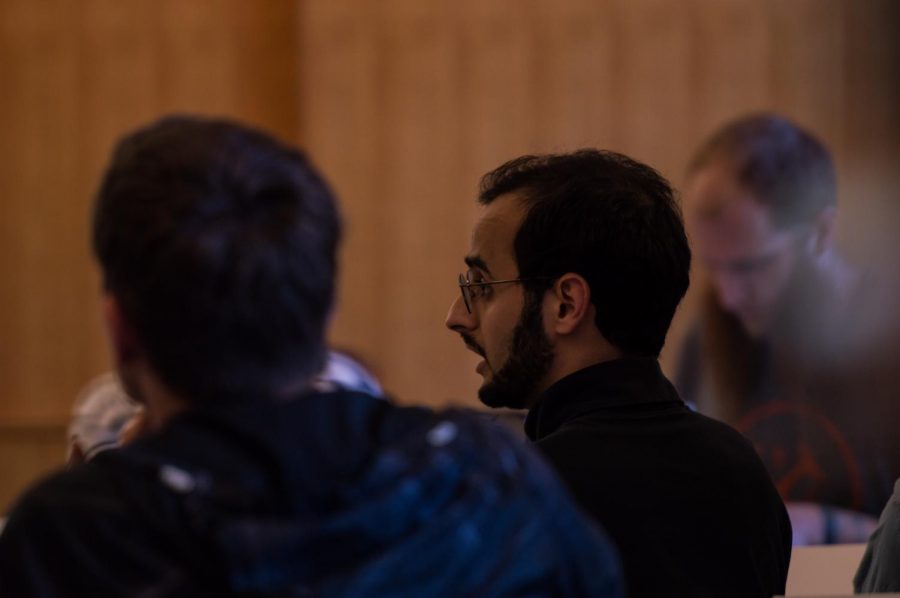Controversial ASOSU bill rejected in House of Representatives
May 25, 2016
House member votes came in as the majority said “no” and three abstained. Applause from a full student gallery erupted shortly after.
More than 25 Oregon State University students sat in the gallery during Wednesday night’s student government House of Representatives meeting when the majority of members voted against JB-07.23.
The rejection of the controversial bill comes after deliberation between the Associated Students of Oregon State University House and Senate this week. Authored by Corey Fisher, ASOSU graduate representative, and Joshua Kaufman, ASOSU senator and incoming Speaker of the House, the bill would have placed the Student and Incidental Fees Committee (SIFC) directly under the legislative branch of ASOSU.
One purpose of JB-07.23 was to separate potential powers of special interest among the executive branch. ASOSU officials who shared concerns of this include current Speaker of the House Mykael Moore, Fisher and Kaufman.
“We wanted to try to distance those powers and distribute where those powers lie,” Fisher said.
Some believe this shift to be a conflict of interest due to the fact that the SIFC and ASOSU House of Representatives hold a joint session each budget season to discuss continued recommendations for dollar amounts. With JB-07.23 in place, the process could have affected or disregarded decisions and discussions that have allowed parties to reach an agreement.
“The budget process has been somewhat disjointed between the SIFC and Congress, and that leads to the mediation committee more often than ASOSU might want,” Kaufman said during the ASOSU Senate meeting Tuesday night. “When we say ‘integrate,’ we’re not talking about who has power over who (…) it’s to get the two bodies to work together so when budget season comes around, it moves more efficiently.”
Others throughout the weeks claim that the process was rushed.
Miscommunications, misconceptions
Sami Al-AbdRabbuh, graduate representative for ASOSU, said he was one of the first individuals to notify members of the Memorial Union advisory board.
“Everyone in the board did not know about this bill until I mentioned it to them,” he said. “The SIFC members … not all of them had known about it until very late in the process.”
Al-Abdrabbuh had commended the bill for also addressing set pay rates and professional training for the SIFC bill, but remained concerned about the conflict of interests present and the lack of communication involved.
“Are we representing the needs of the students?” Al-Abdrabbuh asked.
Chip Campbell, ASOSU representative, said the notion that the bill could change how SIFC represents students seemed nonsensical.
“I don’t quite see the claims of congressional overreach that have been made,” Campbell said.
Krista Burrows, member of the SIFC, said the bill did not reflect the intentions and goals of the SIFC or an ethical process for student fee setting.
“There is an obvious conflict of interest already, but I think this would make it a bigger one,” Burrows said.”
The process, according to Burrows, was “unorganized in general” and included information received on “with short notice.”
“I heard about this bill from a friend, not by being a member of SIFC, which I think is wrong,” Burrows said. “It would change the process a lot and the stakeholders should have all been included.”
Quorum difficulties
During the meeting, Moore mentioned that the House of Representatives had failed to make quorum four weeks in a row, mentioning that representatives should not have tried “rushing” bills.
“It is week nine and I have six bills on my docket,” Moore said. “If you’re feeling frustrated, feeling guilty, that’s on you.”
Other Bills that passed during the ASOSU House meeting Wednesday night include JB-07.26, a bill to add the “It’s On Us” sexual assault campaign within ASOSU operations; JB-07.25, a bill to move ASOSU elections to winter term instead of spring term; JB-07.24, a bill to decrease ASOSU staff pay, including within the executive branch; and HR-07.02, a bill to encourage that university administrators not remove a community garden and replace it with a parking lot.
The next major ASOSU House meeting takes place on June 1, when current members of the student government will pass their positions on to next year’s staff.











































































































